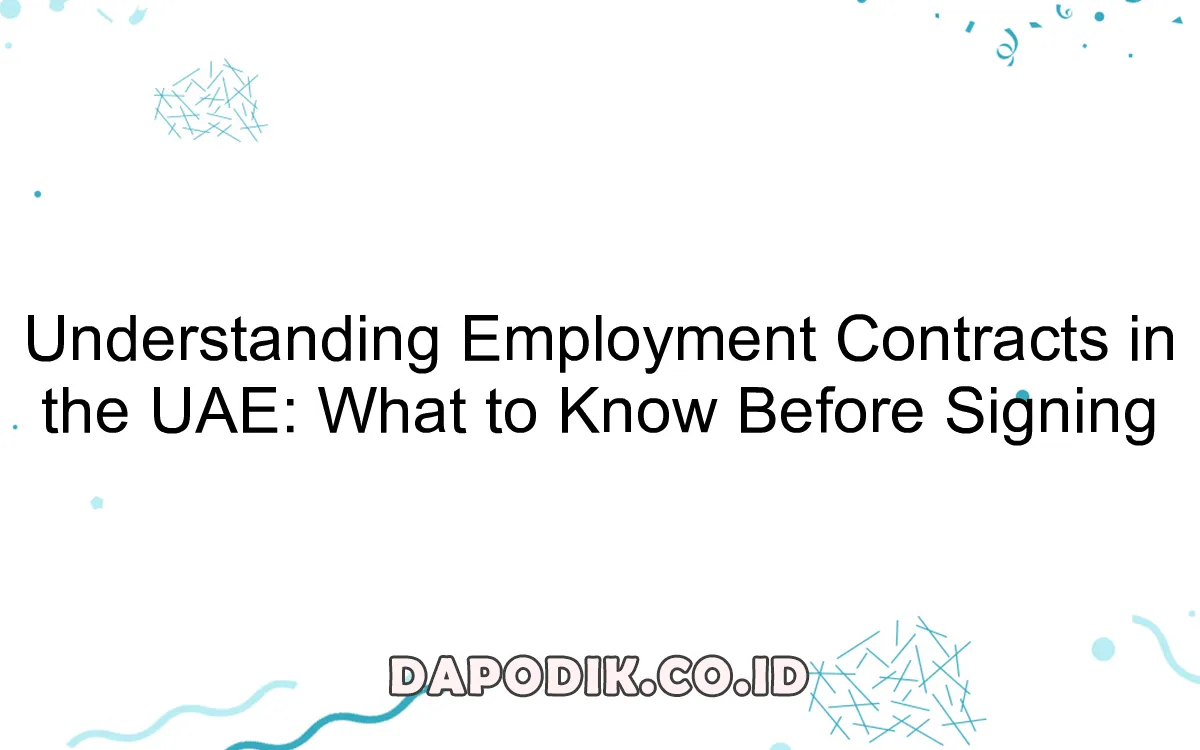Understanding Employment Contracts in the UAE: What to Know Before Signing
Are you planning to work in the United Arab Emirates (UAE)? Before signing any employment contract, it’s crucial to understand the ins and outs of the employment regulations in the UAE. This article will guide you through the key aspects of employment contracts in the UAE, ensuring you make an informed decision.
Types of Employment Contracts in the UAE
In the United Arab Emirates (UAE), there are different types of employment contracts that are commonly used by employers. It is important for employees to understand these contracts before signing to ensure they are aware of their rights and obligations.
1. Limited Term Contract
A limited term contract, also known as a fixed-term contract, is an employment agreement that has a specific start and end date. This type of contract is common for projects, seasonal work, or temporary positions. It provides both the employer and employee with clarity on the duration of the employment.
2. Unlimited Term Contract
An unlimited term contract, as the name suggests, does not have a specified end date. It continues until either the employer or employee terminates the contract by giving the required notice period. This type of contract offers more job security and typically includes benefits such as annual leave, sick leave, and end-of-service gratuity.
3. Part-Time Contract
A part-time contract is an agreement where an employee works for fewer hours compared to a full-time employee. The terms and conditions for part-time employment are negotiated between the employer and employee, and it is important to ensure that the terms are clearly stated in the contract.
4. Freelance Contract
A freelance contract, also known as a service contract, is commonly used for self-employed individuals who provide services on a contractual basis. Freelancers are not considered employees and usually have more flexibility in terms of working hours and location, but they are not entitled to employee benefits.
5. Probationary Contract
A probationary contract is a temporary agreement that allows an employer to observe the performance of a new employee before confirming the permanent employment. During the probation period, both the employer and employee have the right to terminate the contract with a shorter notice period.
6. Limited Contract Renewal
In some cases, a limited term contract may be renewed upon agreement between the employer and employee. The terms and conditions of the renewed contract should be clearly stated to avoid any misunderstandings.
Understanding the different types of employment contracts in the UAE is essential for both employers and employees. It is advisable to seek legal advice and carefully review the terms before signing any contract to ensure that all rights and responsibilities are clearly defined.
Essential Clauses and Terms in UAE Employment Contracts

When it comes to securing a job in the United Arab Emirates (UAE), it is crucial to have a proper understanding of employment contracts. These legal agreements outline the rights and responsibilities of both the employer and the employee, ensuring a fair and transparent working relationship. Before signing any employment contract in the UAE, it is essential to be aware of the following key clauses and terms:
1. Contract Duration and Renewal:
Always pay attention to the contract duration specified in the agreement. UAE labor law requires all contracts to have a specific start and end date. Contracts can be for a limited period, which typically ranges from 6 months to 2 years, or for an unlimited period. Make sure you understand the terms related to contract renewal, which should be mutually agreed upon by both parties.
2. Probationary Period:
Many employment contracts in the UAE include a probationary period, during which the employer assesses the performance of the employee. This period usually lasts between 3 to 6 months. Understand the conditions and terms related to the probationary period, including the possibility of termination without notice or compensation.
3. Job Title and Description:
Ensure that your job title and description are accurately mentioned in the employment contract, as it determines your role and responsibilities within the organization. This section should also include details of your working hours, including overtime. It is crucial to clarify any concerns or discrepancies before signing the contract.
4. Salary and Benefits:
Review the salary and benefits section of the contract thoroughly. It should clearly specify your monthly or annual salary, mode of payment, gratuity, annual leave, sick leave, and any other allowances or benefits you are entitled to. Ensure that the remuneration package meets your expectations and is in accordance with the UAE labor law.
5. Termination Clause:
Understanding the termination clause is vital to protect your rights as an employee. This section should outline the circumstances under which either party can terminate the contract, along with the notice period required. Be aware of any penalties or consequences associated with early contract termination and ensure they are fair and reasonable.
6. Confidentiality and Non-Competition:
Some contracts may include clauses regarding confidentiality and non-competition. This means that you may be required to maintain the confidentiality of sensitive information related to the company and avoid working for competitors during or after your employment. Carefully evaluate the scope and duration of these clauses to ensure they are reasonable.
7. Dispute Resolution:
It is essential to have a clear understanding of the dispute resolution process outlined in the contract. UAE labor law provides certain mechanisms for resolving employment-related disputes, including mediation and labor courts. Familiarize yourself with these processes to protect your rights in case of any disagreements.
Remember, employment contracts are legally binding documents that govern your professional relationship with the employer. It is always advisable to seek legal advice or consult with a labor specialist if you have any doubts or concerns before signing the contract.
Resolving Disputes: Employment Contract Rights and Remedies
When it comes to understanding employment contracts in the UAE, it is essential to be well-informed about your rights and the available remedies in case of disputes. Signing an employment contract is a significant step towards securing a job and entering into a professional relationship, but it is crucial to comprehend the terms and conditions thoroughly before putting pen to paper.
1. Understanding Contractual Rights
Employment contracts in the UAE typically outline the agreed-upon terms and conditions between the employee and the employer. It is important to carefully review the contract to ensure that it contains the correct information regarding your job title, responsibilities, working hours, compensation, leave entitlements, and other key employment details.
2. Resolving Disputes
Even with the most carefully crafted contracts, disputes may occasionally arise in the workplace. In the event of a dispute, it is recommended to pursue amicable resolution methods first, such as open communication and negotiation with the employer or human resources department.
If initial attempts at resolution fail, the UAE labor law provides several avenues for employees to seek remedies, such as:
- Filing a complaint with the Ministry of Human Resources and Emiratisation
- Mediation through the Ministry’s Labor Relations Department
- Initiating legal proceedings at the local labor court
- Seeking assistance from a labor lawyer
3. Importance of Legal Advice
Given the complexities of employment law, seeking legal advice from a qualified professional is advisable, especially when dealing with serious disputes. An experienced labor lawyer can provide guidance and representation throughout the resolution process, ensuring your rights are protected and all necessary legal steps are taken.
In conclusion, understanding employment contracts in the UAE is vital before signing and entering a new job. By being aware of your contractual rights and knowing the available remedies to resolve disputes, you can navigate your professional journey with greater confidence.
Conclusion
Before signing an employment contract in the UAE, it is crucial to understand its terms and conditions thoroughly. Ensure that you are aware of factors such as salary, benefits, working hours, and termination clauses. Seeking legal advice can provide valuable insights and protect your rights throughout your employment journey.

Posting Komentar untuk "Understanding Employment Contracts in the UAE: What to Know Before Signing"
Gambar ataupun video yang ada di situs ini terkadang berasal dari berbagai sumber media lain. Hak Cipta sepenuhnya dipegang oleh sumber tersebut.